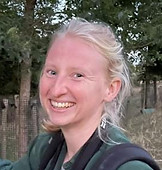
LAB MEMBERS

PhD Candidates

Jorine Geertsema
Jorine is focusing on the effects of early life stress on the central- and peripheral immune systems and how these affect cognitive ageing and increase vulnerability to Alzheimer’s Disease. An important component of her PhD also touches on how nutritional interventions with anti-oxidant and anti-inflammatory capacities could potentially modulate these effects. As a perfect match with her project, Jorine loves food and poledances to counterbalance this love to (hopefully) stay healthy later in life.

Vera Korenblik
Vera studies the role of the gut microbiota in depression through an interdisciplinary and translational approach. Specifically, she investigates the role of butyrate - a bacterial metabolite – in the communication between the gut and the brain, and whether treatment with butyrate could be a therapeutic target for depression. Lastly, she looks at the association between early life adversity and the gut microbiota composition, since early life adversity is a prominent risk factor for depression. In her freetime, Vera plays field hockey and boardgames. She also likes bird watching, geocaching and cooking home-made Italian pasta.

Natalia Schilder
Natalia is looking into how early-life adversity modulates mental and metabolic health later in life and how nutritional interventions early in life can prevent the these long lasting effects of early life adversity. She has a specific interest in the effect of early life adversity exposure on barriers between mother and offspring, i.e. the mammary gland, placenta and blood brain barrier, and sex differences in such barriers in the offspring. In addition she aims to understand whether these mechanisms are evolutionary conserved with help of live-bearing fish and mouse models. Natalia is passionate about nature, art, music and all that boosts creativity.

Emmy Hoeksema
Emmy is interested in the mechanisms of how early-life adversity modulates and aggravates cognitive dysfunction later in life. She aims to identify inflammatory, metabolic and lipid biomarkers that are predictive of cognitive decline and to investigate possible causal links in preclinical models. She does so together with an international consortium, leveraging human cohort data in combination with preclinical mouse models. In the end, she hopes to mitigate cognitive decline using nutritional intervention with omega-3 polyunsaturated acids. As non-science related interests, she likes to read romance novels, sip wine, run, walk with the dog and travel.

Niek Renckens
Niek is a PhD candidate investigating the impact of early-life environmental factors, including stress and diet, on the progression and severity of Alzheimer’s disease. Under the guidance of Dr. A. (Aniko) Korosi and Dr. H. (Harm) Krugers, his research aims to identify neurobiological changes in microglia and neurons caused by early-life stress and how these alterations accelerate the progression of Alzheimer’s disease. His work is part of the MODEM (Mechanisms Of DEMentia) consortium, a nationwide collaboration between Dutch University Medical Centers that seeks to uncover the underlying mechanisms of dementia and develop protective strategies against the disease. Outside of his scientific pursuits, Niek enjoys cooking, biking, watching movies, and horseback riding.

Tamara Versluis
Tamara studies the link between early life stress and Alzheimer's disease, supervised by dr. Harm Krugers, dr. Aniko Korosi, prof. dr. Onno Meijer (Leiden University) and prof. dr. Paul Lucassen. Early life stress is a risk factor for Alzheimer's and causes increased amyloid pathology and memory impairment. Funded by Alzheimer Nederland, she investigates whether targeting the glucocorticoid receptor (a stress hormone receptor) in microglia (the immune cells of the brain) can mitigate early life stress-induced effects on Alzheimer's pathology. In addition, she aims to understand the underlying mechanisms of why early life stress is a risk factor for Alzheimer's disease. In her freetime, Tamara likes playing field hockey, singing, traveling, reading, and cooking.
Post-docs

Anna Sancho Balsells
Anna Sancho is a postdoctoral researcher whose work is part of the EU-funded project HappyMums. Her research focuses on understanding the complex interactions between maternal stress and fetal development, particularly through the placenta-brain axis. She investigates how adverse prenatal conditions experienced by the mother are transmitted to the developing offspring, increasing their risk of developing negative outcomes later in life. Her research also investigates the role of the neuronal-immune-hormonal triad in this transmission. Additionally, she aims to explore whether the placenta-brain axis is conserved across different species. In her free time, Anna enjoys practising sports, reading, and travelling
Former lab members

Hannah Juncker
Hannah is a medical doctor, studying human aspects of early-life stress and nutrition. In collaboration with researchers from the Amsterdam University Medical Center and the Dutch Human Milk Bank she investigates how maternal stress in the postpartum period affects the nutritional composition of human milk, how maternal dietary intake may influence this process, and how this subsequently affects (neuro)development of the infant. Next to her work as a researcher, she likes to travel, cook and spend time with friends and family.

Tiffany Ernst
Tiffany is a PhD candidate co-supervised by Aniko Korosi (UvA) and Bart Pollux (WUR) studying the interactions between stress and pregnancy in live-bearing fishes. Her research focuses on the porthole live-bearer (Poeciliopsis gracilis), a freshwater fish from Central/South America which not only has internal fertilization and live birth but is also superfetatious, meaning it can carry more than one brood of offspring simultaneously. Using this unique species as a model, Tiffany aims to understand how the stress of pregnancy impacts maternal cognition and neurogenesis in a species like P. gracilis which is almost continuously pregnant in adulthood. Additionally she is investigating how further stress, either prior to pregnancy (in the form of coercive mating tactics) or during pregnancy (maternal infection, isolation, & handling), mediates long-term impacts on maternal health and cognition. When she is not busy researching fishes Tiffany enjoys traveling, sewing her own clothes, and going on long walks.

Michael Roy Vencer Malaluan
Michael is an MD-PhD student at the University of the Philippines College of Medicine. He is a guest researcher funded by the Philippine Council for Health Research and Development (PCHRD) and the University of the Philippines (UP). For his thesis, he is looking into the hypothalamus, specifically studying the sex differences in the response to early life stress (ELS), acute stress, and the response to acute stress when there is prior ELS exposure. Michael is passionate about child protection and mental health, likes talking about his cat, Tofu, and enjoys freediving and going to the beach.

Veronica Begni
Dr. Veronica Begni joined the lab headed by Prof. Riva at the University of Milan in 2014 when she obtained a fellowship for the PhD program in Experimental and Clinical Pharmacology. After achieving her PhD in 2018, she was awarded a postdoctoral fellowship to continue her studies. In 2019, she spent a six-month period in Dr. Korosi’s lab. One of the main goals of her research is to use preclinical models to unravel the mechanisms of vulnerability to neuropsychiatric disorders following exposure to early life stress, with a particular focus on the transition phase across adolescence. This will eventually allow the identification of novel targets for therapeutic interventions (pharmacological or not) aimed at correcting or preventing the dysfunctions originating from early life stress exposure.

Eva Naninck
Eva is interested in the role of nutritional factors in the programming of brain structure and function by early life stress. She studies if supplementation with essential micronutrients can protect against early-life stress induced cognitive decline. During her PhD research in the Korosi-group, Eva studied the direct and lasting effects of early-life stress on hippocampal plasticity and cognitive function and sex-differences in the vulnerability to these effects. She became particularly interested in the potential of nutritional intervention with essential micronutrients to prevent the lasting effects of ES on the brain. Currently she is taking her research from bench to bedside and studies in a collaborative clinical research project with Nutricia Research/ Nederlandse moedermelkbank the effects of stress on breastmilk composition and the effects on child development.
e.f.g.naninck@uva.bl

Susanne de Rooij
Susanne is an epidemiologist with a background in biological psychology. Her research focuses on early life nutrition and stress and effects on brain and behaviour. Aniko and Susanne received a grant from the Amsterdam Brain and Cognition Centre to study the role of fat metabolism and nutritional status in early-life stress induced cognitive impairments. For this project, they will combine their expertise on early life stress in animal and human studies and integrate data from the Dutch famine birth cohort study, the Amsterdam Born Children and their Development study and animal work from the Korosi group.
s.r.derooij@amc.uva.nl

Claudia Sestito
Claudia is studying the role of astrocytes in MDD and early-life stress using iPSC and mouse early life stress animal models in a project funded by the ABMP granted to Dr. A. Korosi and Dr. V. Heine

Silvie Ruigrok
Sylvie is interested in dietary modulators for cognitive ageing and brain plasticity. Together with an international consortium, she investigates whether and how dietary/bioactive compounds could prevent against early-life stress induced cognitive decline. Besides she loves spending time in the lab, she also enjoys reading, spending time with friends and family and traveling.
s.r.ruigrok@uva.nl

Kitty Reemst
Kitty is studying the effects of early life stress and the involvement of the (neuro)-immune system, epigenetic mechanisms and nutrition. She wants to find out how these mechanisms could be affected by ELS and mediate it effects. She is especially interested in the interaction between the different mechanisms and whether it is possible to modulate their functions in order to prevent the detrimental effects of ELS. She will use in vivo mouse models as well as in vitro systems. Besides research Kitty loves to see more of the world by traveling, reading and watching documentaries.
k.reemst@uva.nl

Kit-Yi Yam
Kit-Yi is studying the lasting effects of stress, nutrition and metabolic factors in early-life on lipid metabolism and adult brain structure and function. She is particularly interested in the roles of leptin and ghrelin in modulating the brain. Additionally, she investigates if and how early dietary interventions with essential fatty acids can prevent early-life stress induced cognitive impairments. Due to the highly translational aspect of her research, she has established national and international collaborations, e.g. Nutricia Research and RMIT University in Melbourne, Australia. Kit-Yi greatly enjoys travelling; grand slam tennis tournaments are amongst her favorite destinations.
k.y.yam@uva.nl

Lianne Hoeijmakers
Lianne is investigating the consequences of early-life stress on microglia function and neuroinflammation in the context of Alzheimer’s disease and aging. She studies how microglia and neuroinflammatory factors are altered throughout life by exposure to early-life stress, and how such alterations can contribute to Alzheimer’s disease related neuropathology. Lianne likes spending time cycling in the Amsterdam area and cooking for family and friends.
L.hoeijmakers@uva.nl

Maralinde Abbink
Maralinde is a PhD student that focuses on studying the effects of early life stress and the interaction with nutritional factors on brain development. She is specifically interested in the role of a subset of brain cells, called astrocytes, and studies how these cells are involved in the way early life stress and nutrition program the brain for later life. Maralinde has a passion for music and loves to sing.
m.r.abbink@uva.nl


